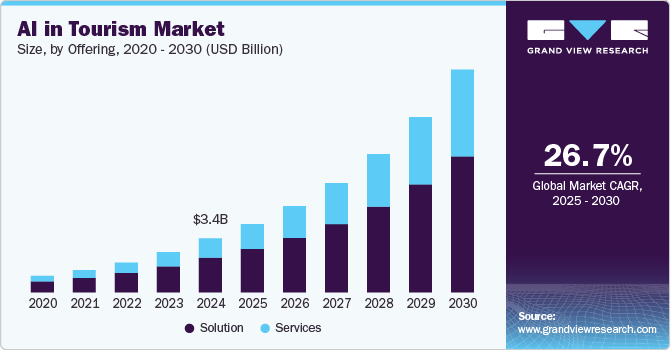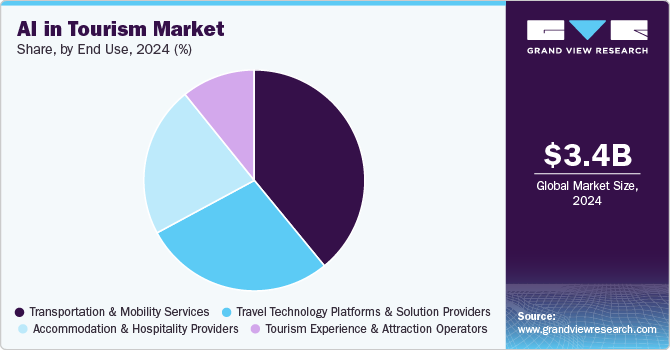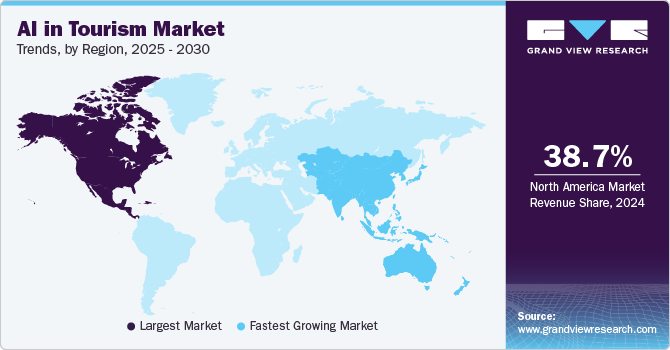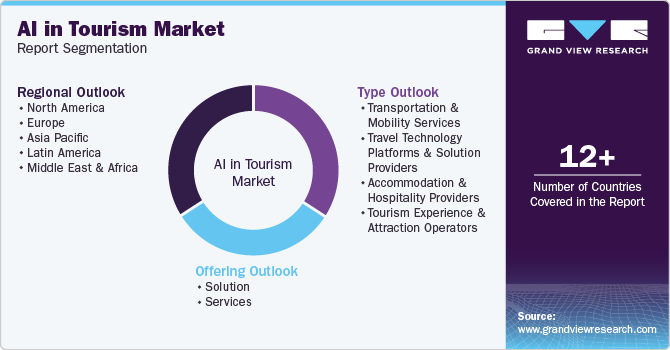
AI in Tourism Market Size, Share & Trends Analysis Report By Offering (Solution, Services), By End Use (Transportation & Mobility Services, Travel Technology Platforms & Solution Providers), By Region, And Segment Forecasts, 2025 - 2030
- Report ID: GVR-4-68040-548-8
- Number of Report Pages: 200
- Format: PDF
- Historical Range: 2018 - 2023
- Forecast Period: 2025 - 2030
- Industry: Technology
AI in Tourism Market Size & Trends
The global AI in tourism market size was estimated at USD 3,373.0 million in 2024 and is projected to grow at a CAGR of 26.7% from 2025 to 2030. Travel and tourism platforms are increasingly using artificial intelligence to offer real-time recommendations that reflect each traveler’s specific interests. These systems analyze large volumes of data such as search history, location, and behavior patterns to provide suggestions that align closely with individual preferences.

This level of customization not only improves user satisfaction but also increases engagement and conversion rates for travel providers. As AI adoption deepens across the industry, such personalized experiences are likely to become a fundamental part of tourism platforms. Companies are developing AI-powered assistants that provide real-time, personalized travel information and support local digital transformation efforts. For instance, in December 2024, Wipro, in collaboration with SIAM.AI, an AI infrastructure and services provider in Thailand, and using NVIDIA Corporation’s AI platform, developed Sukjai, an AI-powered assistant for the Tourism Authority of Thailand, to offer real-time, personalized travel information and support. This initiative supports Thailand’s sovereign AI goals and enhances the tourist experience through multilingual, responsible AI-driven services.
Companies are increasingly utilizing big data and AI analytics to improve the quality and efficiency of tourism services. These tools enable real-time updates that assist both travelers and service providers in making informed decisions. AI-driven predictive maintenance ensures that transportation systems operate without unexpected breakdowns, enhancing reliability. In addition, advanced logistics optimization helps reduce delays and streamline operations, contributing to a more seamless travel experience. For instance, in February 2024, as a part of Huawei’s initiatives unveiled at MWC Barcelona 2024, the company introduced four new ICT solutions focused on transforming transportation with intelligent technologies. Collaborations with entities such as Tianjin Port Group and Côte d'Ivoire’s Ministry of Transport reflect the use of AI, big data, and 5G to optimize infrastructure, improve real-time operational visibility, and enhance passenger safety. These partnerships show how companies are using data-driven systems for predictive maintenance, real-time service updates, and logistics optimization. Such advancements are directly connected to efforts to improve the efficiency and quality of tourism-related transportation services.
Companies are increasingly adopting AI systems to strengthen safety measures across tourism services. These systems can deliver real-time alerts that notify tourists about weather disruptions, transportation delays, or crowd surges at popular attractions. Emergency guidance is being integrated into apps and platforms, helping travelers navigate crises or unfamiliar environments more confidently. Location-based AI features are also enabling situational awareness by analyzing environmental and social data. This ensures tourists receive timely instructions based on their specific context. Such safety-focused AI tools are becoming essential for building trust and confidence among global travelers.
Offering Insights
In terms of offering, the solution segment dominated the market in 2024 with a 64.1% revenue share. This segment includes software platforms and AI tools that enable automation, personalization, and data analysis. Companies are increasingly adopting AI-driven solutions to enhance user experiences and improve operational efficiency. The demand for real-time insights, dynamic pricing engines, and intelligent search capabilities is driving this segment's growth. AI solutions are being integrated into booking systems, mobile apps, and digital interfaces to streamline services. As tourism businesses shift toward smarter infrastructure, the solution segment continues to see strong traction.
Services are experiencing significant growth in the market due to rising demand for the implementation, maintenance, and integration of AI solutions across travel platforms. Companies are increasingly relying on managed and professional services to ensure seamless deployment of AI technologies. These services help optimize customer engagement tools, chatbots, recommendation systems, and data analytics platforms. The complexity of AI systems requires continuous support and customization, boosting service adoption. Travel operators and tourism boards are seeking expert support to scale AI capabilities across channels. As a result, the services segment is becoming a crucial enabler of AI transformation in the tourism industry.
End Use Insights
The transportation & mobility services segment held the largest market revenue share in 2024. This dominance is driven by the widespread integration of AI in areas such as route optimization, dynamic pricing, and autonomous transportation. Ride-sharing platforms, airlines, and rail networks are increasingly using AI to enhance operational efficiency and improve customer experience. Predictive maintenance, real-time travel updates, and personalized journey planning have become standard offerings in this segment. The growing demand for seamless and connected travel experiences continues to push investment in AI-powered mobility services.

The accommodation & hospitality providers segment is expected to grow notably in the forecast period as the tourism industry adopts advanced AI technologies. Companies in this space are incorporating smart room controls, AI-based personalization, and intelligent concierge services to elevate guest experiences. Chatbots and virtual assistants are increasingly handling routine inquiries, enabling faster response times and reduced pressure on human staff. AI-driven tools are also helping hotels analyze guest behavior and preferences, leading to better service offerings and operational efficiency. These innovations are driving cost savings and improving satisfaction levels.
Regional Insights
North America artificial intelligence (AI) in tourism industry dominated globally with a revenue share of 38.7% in 2024. The market in North America is experiencing steady expansion, driven by increasing demand for personalized travel services and efficient operational tools. Major travel and hospitality companies are investing in AI-driven platforms to improve customer engagement, booking experiences, and predictive analytics. Real-time language translation, facial recognition at airports, and AI-based chatbots are becoming more widespread in tourism-related services across the region. The growing use of AI in transportation management, particularly in cities with high tourist volumes, is also supporting this trend.

U.S. Artificial Intelligence in Tourism Market Trends
AI in tourism industry in the U.S. attributes its dominance to the early adoption of advanced digital technologies and a highly developed tourism infrastructure. Companies across the country are leveraging AI to deliver hyper-personalized travel recommendations, automate customer support, and streamline hotel and airline operations. Airports are incorporating AI for security screening and passenger flow management, improving efficiency and traveler satisfaction. Leading travel tech firms and hospitality chains headquartered in the U.S. continue to invest in machine learning, predictive algorithms, and voice-based AI assistants.
Europe Artificial Intelligence in Tourism Market Trends
The artificial intelligence (AI) in tourism industry in Europe is gaining traction as countries work to enhance digital infrastructure and modernize tourism services. Popular destinations such as France, Italy, and Spain are integrating AI into transportation hubs, hotels, and tourism information centers to handle growing visitor volumes. Governments and private players are collaborating on AI-driven sustainability solutions, smart booking systems, and immersive cultural experiences. Multilingual AI assistants are especially valuable across Europe’s diverse linguistic landscape, helping improve accessibility for international tourists.
Asia Pacific Artificial Intelligence in Tourism Market Trends
The Asia Pacific artificial intelligence (AI) in tourism industry is anticipated to register the fastest CAGR over the forecast period. The Asia Pacific region is showing rapid growth in the market due to strong government initiatives, expanding tourism sectors, and widespread digital adoption. Countries such as China, Japan, South Korea, and Thailand are deploying AI for smart tourism applications ranging from crowd management to AI-guided tours. The growing popularity of super-apps integrating travel services and AI capabilities is transforming how travelers plan and experience their trips. Advanced analytics and recommendation engines are being used to tailor travel packages and boost customer loyalty. Regional tech firms are playing a central role in creating AI ecosystems for tourism.
Key AI in Tourism Company Insights
Some of the key companies in the global artificial intelligence in tourism industry include Amazon Web Services, Inc. (AWS), Appier Inc., Huawei Technologies Co., Ltd., IBM Corporation, Microsoft, and NVIDIA Corporation. Organizations are focusing on increasing customer base to gain a competitive edge in the industry. Therefore, key players are taking several strategic initiatives, such as mergers and acquisitions and partnerships with other major companies.
-
IBM Corporation is enhancing AI development in tourism by focusing on intelligent automation and operational efficiency. Its AI solutions aim to improve decision-making, streamline workflows, and personalize traveler interactions. The company is working on embedding AI into various layers of tourism infrastructure. Its efforts emphasize data security, responsible AI use, and seamless integration across services.
-
Microsoft is advancing AI in tourism through cloud-based platforms that support intelligent data processing and service personalization. Its developments target the automation of customer engagement and optimization of logistics in travel. AI tools are being designed to interpret consumer behavior and enhance service delivery. The focus remains on scalable solutions that align with the evolving demands of the tourism sector.
Key AI In Tourism Companies:
The following are the leading companies in the AI in tourism market. These companies collectively hold the largest market share and dictate industry trends.- Amazon Web Services, Inc. (AWS)
- Appier Inc.
- Huawei Technologies Co., Ltd.
- IBM Corporation
- Microsoft
- NVIDIA Corporation
- Sabre Corporation
- Salesforce, Inc.
- SAS Institute Inc.
- Snowflake Inc.
Recent Developments
-
In March 2025, Riyadh Air expanded its collaboration with IBM Corporation to integrate artificial intelligence across its operations to become the world's first fully digital-native airline. The initiative focuses on using IBM’s AI capabilities, including Watsonx and Agentic AI, to enhance customer experience, streamline flight operations, and drive intelligent decision-making while ensuring data security and responsible AI deployment.
-
In March 2025, LG Uplus, a South Korean telecommunications and technology Company, partnered with Amazon Web Services to accelerate AI transformation in Korea by developing a sovereign cloud, AI platforms, and consulting services. The collaboration focuses on enabling rapid AI adoption for businesses, enhancing customer service capabilities, and strengthening data security and sovereignty.
-
In September 2024, Snowflake launched its AI Data Cloud for the travel and hospitality industry to support data-driven personalization, improve decision-making, and enhance operational efficiency through advanced AI capabilities. The initiative aims to help businesses in the sector modernize their data infrastructure and deliver smarter customer experiences.
Global AI In Tourism Market Report Scope
|
Report Attribute |
Details |
|
Market End Use value in 2025 |
USD 4,255.0 million |
|
Revenue forecast in 2030 |
USD 13,868.8 million |
|
Growth rate |
CAGR of 26.7% from 2025 to 2030 |
|
Base year for estimation |
2024 |
|
Historical data |
2018 - 2023 |
|
Forecast period |
2025 - 2030 |
|
Quantitative units |
Revenue in USD million/billion and CAGR from 2025 to 2030 |
|
Report coverage |
Revenue forecast, company ranking, competitive landscape, growth factors, and trends |
|
Segment scope |
Offering, end use, region |
|
Region scope |
North America; Europe; Asia Pacific; Latin America; Middle East & Africa |
|
Country scope |
U.S.; Canada; Mexico; Germany; UK; France; China; Japan; India; Australia, South Korea, Brazil, KSA, UAE, South Africa |
|
Key companies profiled |
Amazon Web Services, Inc. (AWS); Appier Inc.; Huawei Technologies Co., Ltd.; IBM Corporation; Microsoft; NVIDIA Corporation; Sabre Corporation; Salesforce, Inc.; SAS Institute Inc.; Snowflake Inc. |
|
Customization scope |
Free report customization (equivalent up to 8 analysts’ working days) with purchase. Addition or alteration to country, regional & segment scope |
|
Pricing and purchase options |
Avail customized purchase options to meet your exact research needs. Explore purchase options |
Global Artificial Intelligence in Tourism Market Report Segmentation
This report forecasts revenue growth at global, regional, and country levels and provides an analysis of the latest industry trends and opportunities in each of the sub-segments from 2018 to 2030. For this study, Grand View Research has segmented the global artificial intelligence in tourism market report based on offering, end use, and region.

-
Offering Outlook (Revenue, USD Million, 2018 - 2030)
-
Solution
-
Services
-
-
End Use Outlook (Revenue, USD Million, 2018 - 2030)
-
Transportation & Mobility Services
-
Travel Technology Platforms & Solution Providers
-
Accommodation & Hospitality Providers
-
Tourism Experience & Attraction Operators
-
-
Regional Outlook (Revenue, USD Million, 2018 - 2030)
-
North America
-
U.S.
-
Canada
-
Mexico
-
-
Europe
-
UK
-
Germany
-
France
-
-
Asia Pacific
-
China
-
Japan
-
India
-
Australia
-
South Korea
-
-
Latin America
-
Brazil
-
-
Middle East & Africa (MEA)
-
KSA
-
UAE
-
South Africa
-
-
Frequently Asked Questions About This Report
b. The global AI in tourism market size was estimated at USD 3,373.0 million in 2024 and is expected to reach USD 4,255.0 million in 2025.
b. The global AI in tourism market is expected to grow at a compound annual growth rate of 26.7% from 2025 to 2030 to reach USD 13,868.8 million by 2030.
b. North America dominated the AI in tourism market with a share of 38.7% in 2024. This is attributable to the strong presence of advanced technology infrastructure, high adoption of AI solutions, and significant investments in digital transformation across the travel sector.
b. Some key players operating in the AI in tourism market include Apple Inc., IBM Corporation, ID Quantique, Infineon Technologies AG, Microchip Technology Incorporated, NXP Semiconductors, Qualcomm Incorporated, Quantum eMotion, STMicroelectronics, and Terra Quantum
b. Key factors that are driving the market growth include increasing demand for personalized travel experiences, rising adoption of AI-powered customer service tools, growing investment in digital transformation by tourism companies, and advancements in machine learning and natural language processing.
We are committed towards customer satisfaction, and quality service.
"The quality of research they have done for us has been excellent."




